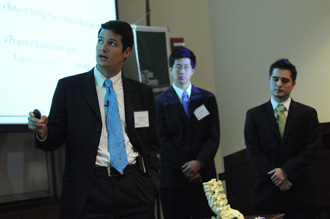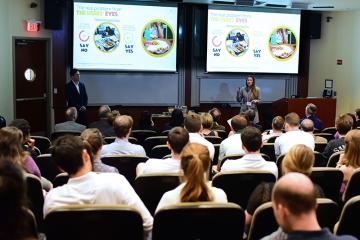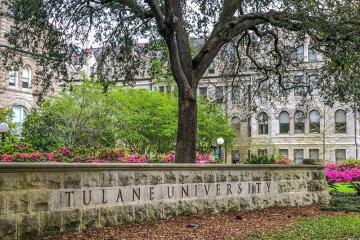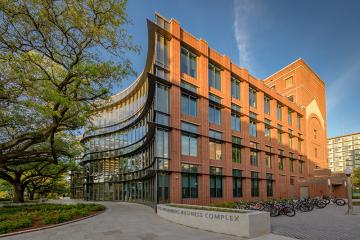Freeman ranked 13th nationally for entrepreneurship
For the fifth consecutive year, the Freeman School has been recognized as one of the top 50 schools in the country for entrepreneurship.
The Princeton Review in its latest survey of entrepreneurship programs ranks the Freeman School 13th on its list of the nation's top graduate programs for entrepreneurs. The ranking appears in the October 2010 issue of Entrepreneur magazine, which hit newsstands on Sept. 21. The ranking can be viewed online at www.entrepreneur.com/topcolleges.

“The Freeman School’s prominent ranking in entrepreneurship education and programming is in large part the result of the passion of our faculty, staff and students for living, thinking and acting like entrepreneurs,” says John Elstrott, clinical professor of entrepreneurship and executive director of the Levy-Rosenblum Institute for Entrepreneurship. “At the Freeman School we believe in freeing the entrepreneurial spirit for the good and that with that spirit we can solve many of the world’s problems.”
Fueled in part by a post-Hurricane Katrina wave of students eager to participate in the rebuilding and revitalization of New Orleans, the Freeman School has in the last five years established a national reputation for social entrepreneurship, which refers to the use of entrepreneurial principles to address social problems. More recently, the Freeman School has become a leader in promoting conscious capitalism, a broader concept that calls for organizations to consider the interests of all stakeholders—including employees, customers, suppliers, shareholders and community members—rather than focusing solely on shareholder returns. The Tulane Business Plan Competition, an annual presentation of the Tulane Entrepreneurs Association, is the only business plan competition in the nation dedicated to the principles of conscious capitalism.
The Princeton Review surveyed more than 2,000 business school to come up with this year’s rankings. Each program was evaluated based on key criteria in the areas of teaching entrepreneurship business fundamentals in the classroom, staffing departments with successful entrepreneurs, excellence in mentorship, and providing experiential learning or entrepreneurial opportunities outside of the classroom as well as for non-traditional, distinguishable aspects of their programs.
“Behind the top ranked schools is not only a great formal classroom experience, but a cross-disciplinary approach to teaching entrepreneurship that embraces and encourages a student’s vision to build a successful business,” said Robert Franek, The Princeton Review’s senior vice president of publishing and nationally recognized expert on college admissions.
“The right education enhances and reinforces curiosity and creative thinking in entrepreneurs,” commented Amy Cosper, vice president and editor in chief at Entrepreneur. “This ranking provides a unique look at top schools that offer the type of training, encouragement and direction that nurtures entrepreneurial skills. It’s an excellent resource for those interested in academics as a pathway to their goals, and it can help tremendously in the discovery process to finding the right program.”
The Freeman School of Business at Tulane, originally the College of Commerce and Business Administration, was established in 1914 and is a founding member of AACSB, the premier accrediting body for collegiate schools of business. Today, Freeman is a leading, internationally recognized business school with more than 2,000 students in programs spanning three continents. The Freeman School is consistently listed among the nation’s best business schools by publications including U.S. News & World Report, BusinessWeek, Forbes, Financial Times and AméricaEconomía.




